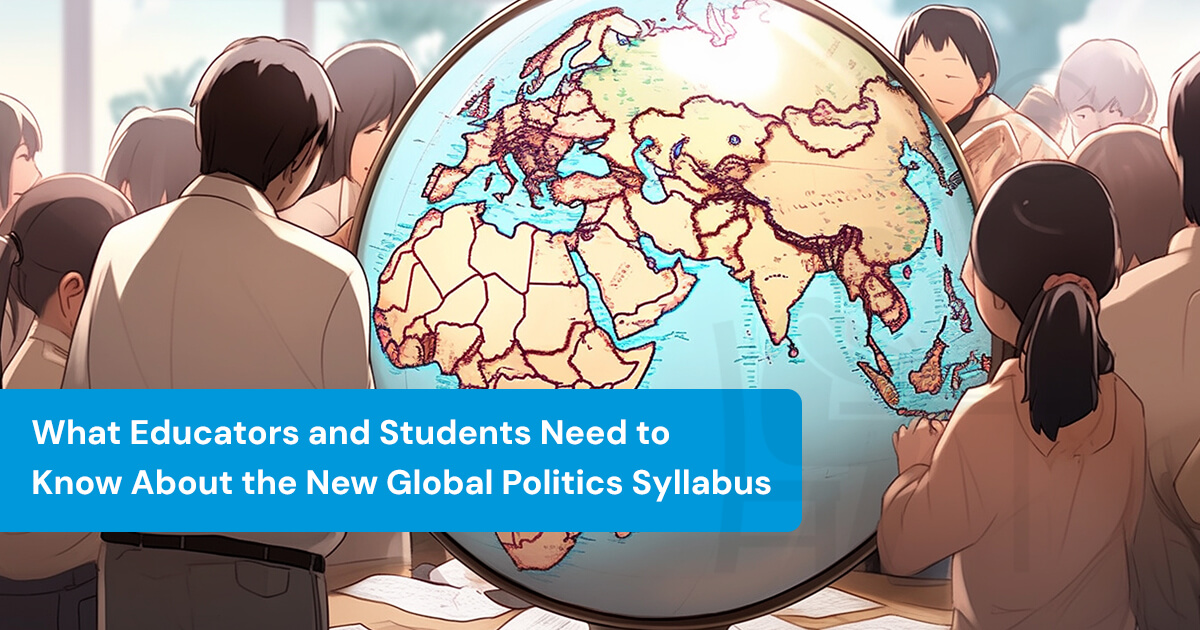The International Baccalaureate (IB) has introduced a new syllabus for the Global Politics course, aiming to enhance the educational experience by addressing contemporary global issues and developing critical thinking skills. This blog provides an overview of the fundamental changes and what educators and students need to know to navigate the new curriculum effectively.
Introduction to the New Syllabus
The updated Global Politics syllabus is designed to offer a more comprehensive and relevant understanding of global political dynamics. It focuses on major themes such as power, human rights, development, peace, and conflict. These themes are explored through case studies and real-world examples, encouraging students to connect theoretical concepts with practical applications.
Key Themes and Concepts
Power
- The new syllabus delves into the concept of power in international relations, examining how power is distributed and exercised in global politics.
- Students will explore different forms of power, including hard power (military force), soft power (cultural influence), and smart power (a combination of hard and soft power).
- Case studies will illustrate how power dynamics shape global events and policies.
Human Rights
- Human rights are a central theme, focusing on understanding the origins, development, and application of human rights in various contexts.
- The curriculum examines key international documents, such as the Universal Declaration of Human Rights, and explores the role of international organisations in promoting and protecting human rights.
- Students will analyse contemporary human rights issues, such as gender equality, refugee rights, and freedom of expression.
Development
- The syllabus covers the concept of development, including economic, social, and political dimensions.
- Students will study different development theories and models and the impact of globalisation on development.
- The course encourages critical thinking about sustainable development and developing countries' challenges.
Peace and Conflict
- This theme explores the causes and consequences of conflict and strategies for conflict resolution and peacebuilding.
- Students will investigate conflicts, from interstate wars to civil wars and terrorist activities.
- This section also covers the role of international organizations, such as the United Nations, in maintaining peace and security.
New Assessment Methods
The revised syllabus introduces new assessment methods to evaluate students' understanding and analytical skills. These include:
Internal Assessments
- Students must complete a political engagement activity involving researching and participating in a political process or event.
- This hands-on approach helps students apply theoretical knowledge to real-world situations and develop practical skills.
Examinations
- The examination structure has been updated to include essays, data responses, and stimulus-based questions.
- These assessments test students' ability to analyse and evaluate political concepts, theories, and case studies.
Extended Essay
- The extended essay component remains an integral part of the curriculum, allowing students to conduct in-depth research on a topic related to the global politics of their choice.
- This fosters independent learning and critical thinking skills.
Skills Development
The new syllabus emphasises developing key skills essential for understanding and engaging with global politics. These skills include:
Critical Thinking
- Students are encouraged to question assumptions, analyse arguments, and evaluate evidence.
- The curriculum promotes an inquiry-based approach, where students learn to think critically about political issues.
Research Skills
- The course requires students to research using various sources, including academic articles, official documents, and media reports.
- This helps students develop the ability to gather, interpret, and present information effectively.
Communication Skills
- Effective communication is a core component of the syllabus, emphasising developing students' ability to articulate their ideas clearly and persuasively.
- Students will engage in debates, presentations, and written assignments to hone their communication skills.
Collaboration
- Group work and collaborative projects are integrated into the curriculum to encourage teamwork and exchanging ideas.
- This prepares students for real-world scenarios where cooperation and negotiation are essential.
Preparing for the New Syllabus
To successfully navigate the new Global Politics syllabus, educators and students should consider the following strategies:
Stay Informed
- Educators should familiarise themselves with the updated syllabus and assessment criteria to provide practical guidance to students.
- Students should stay informed about current global events and trends to enhance their understanding of the course material.
Utilise Resources
- Numerous resources available, including textbooks, online articles, and multimedia content, can help deepen understanding of the themes and concepts.
- Educators should incorporate diverse resources into teaching to cater to different learning styles.
Engage in Discussions
- Class discussions and debates are valuable tools for exploring perspectives and developing critical thinking skills.
- Students should actively participate in these discussions to enhance their analytical abilities.
Seek Feedback
- Regular feedback from teachers can help students identify areas for improvement and refine their understanding of complex political issues.
- Students should seek feedback on their assignments and assessments to improve their performance.
Conclusion
The new Global Politics syllabus offers a comprehensive and engaging framework for understanding contemporary political issues. By focusing on key themes such as power, human rights, development, and peace and conflict, the curriculum prepares students to analyse and engage with global politics critically. With updated assessment methods and an emphasis on skill development, the syllabus equips students with the knowledge and abilities needed to navigate the complexities of the modern world.
